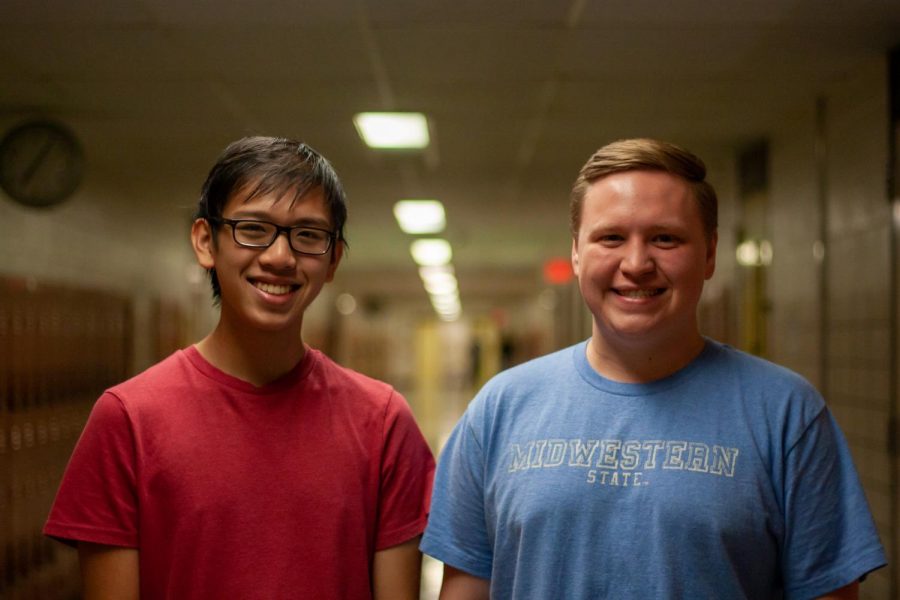The recipe for an Ivy League application
Seniors Viet Tran and Damion Fisher have aspirations to attend Ivy League universities after graduating from high school.
Receiving admission to a prestigious school in the U.S. is becoming increasingly rare. This is because, as the Bureau of Labor Statistics reported in 2017, two out of three high school graduates will continue their education at a university, much higher than data from decades ago.
With the largest applicant pool in history competing for a select number of spots, it isn’t possible to guarantee admission to these top schools, but there are multiple ways to stand out amongst the growing competition.
College Counselor Julie Johnson believes that volunteering, while an essential asset to an application to any competitive school, should be approached with a quality over quantity kind of mindset. Joining multiple clubs without leaving a significant impact is not the way to attract top-tier schools. Admissions officers that review applications are not concerned with the number of volunteer commitments a candidate has to offer.
“What they want to see is growth in one area,” she said. “Just pick a few (interests), and do some quality stuff with that.”
Senior Viet Tran, who is in the process of applying to multiple highly-competitive schools, advises that community service opportunities should be on high school students’ radars because having distinguished leadership roles will carry a student’s application more than a standardized testing score will.
“In my opinion, once you pass the threshold score, which is around 1460, there isn’t any reason to stress over a higher score, because having an improved score doesn’t distinguish you from other applicants,” he said. “Instead, you should focus on activities that will strengthen your application, such as extracurriculars and volunteering in your community.”
Juniors across the nation cram for Scholastic Aptitude Test (SAT) and American College Testing (ACT) exams because they are under the impression that these scores will make or break their chances of being admitted to a school; however, this isn’t completely true.
“While that (standardized testing) is important, it is not necessarily the most important for those schools,” Johnson said.
Senior Damion Fisher, who has just wrapped up his Ivy League applications, understands that while it’s important to aim high and achieve the highest score you possibly can on the SAT/ACT, there are many additional achievements to add to a résumé that will ultimately weigh more in the eyes of an admissions officer.
“Colleges like to see good SAT or ACT when it comes to meeting base requirements, but having a very high SAT or ACT is not going to make you a better candidate than someone with a good SAT or ACT,” he said.
Ivy Leagues, Stanford and other schools searching for the most qualified students in the nation never reveal exactly what they’re looking for. In fact, the perfect student for these schools varies.
“They are looking for, not necessarily the cream of the crop, but they want that student who is going to do something unusual,” Johnson said.
Students who have participated and ranked well in nationwide projects and competitions that are not strictly standardized stand a better chance of admission, as well. Colleges view each student admitted as an investment. They expect each one of their admits to graduate from their prestigious institutions and become global leaders that bring fame and money to the university.
“Ivy leagues are always looking for an individual that will take the initiative and improve the world, which is why it is extremely important to have a ‘spike’ that you can attribute to your name,” Tran said.
The “spike” is the secret that no admissions officer will reveal. Ivy League schools are not looking for a well-rounded student; rather, they are seeking out a well-rounded class. By showing development and dedication to something that he or she is passionate about, the college knows that it’s picking the most qualified candidate to represent the school in that subject.
“You need to show commitment to something that is important to you. Being good at a lot of things is not enough. You need to be great at something you are passionate about,” Fisher said.
Fisher, for example, has been highly involved with the Boys and Girls Club since he was seven years old. From collecting hundreds of volunteer hours to becoming a paid staff member and winning a city-wide Youth of the Year award, he believes that his dedication to the Boys and Girls club will outweigh his involvement in many other school-wide clubs. It’s his spike, what sets him apart from the 30,000-plus applicants competing for the same acceptance letter.
Helpful Links
https://www.youtube.com/channel/UCWZs3J4-EI5nfznIV_lTMJQ


Lilly Studer • Oct 8, 2019 at 5:50 pm
Having visited all the Ivy Leagues and Stanford and going to all their admission tours, one of the most major things these universities are lookin for this day is diversity. They want someone who has a story like no other. Someone who has come over adversity in their life and conquered life. A lot of the schools said that the test scores and organizations almost meant nothing because everyone has the same. The most important part is the story that makes you you to be accepted.